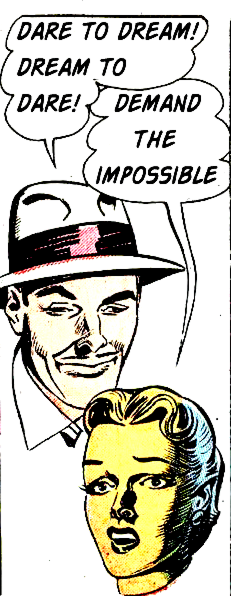
Imagination. The capacity to create imaginaries: visions of other worlds in which our desires and projections can reside, or even thrive, at times when capitalism permits no autonomous space in which communal relations might develop. It is no coincidence that today’s revolutionary movements lack imaginaries of other worlds, nor that a great part of capitalist production supplants imagination among its consumers, offering imaginaries that become more elaborate every day, more visually stimulating, more interactive, so that people no longer have to imagine anything for themselves because a thousand worlds and fantasies already come prepackaged. All the old fantasies that used to set us dreaming have now been fixed in Hollywood productions, with convincing actors, fully depicted terrains, and emotive soundtracks. Nothing is left for us to recreate, only to consume.
In the current marketplace of ideas, it seems that the only imaginaries that describe our future are apocalypses or the science fiction colonization of outer space. Incidentally, the latter is the final frontier for capitalist expansion, now that this planet is rapidly getting used up, and the former is the only alternative capitalism is willing to concede outside of its dominion. We are being encouraged to imagine ourselves in the only worlds that can be conceived from within the capitalist perspective.
The revolutionaries of a hundred years ago continuously dreamed and schemed of a world without the State and without capitalism. Some of them made the mistake of turning their dreams into blueprints, dogmatic guidelines that in practice functioned as yardsticks by which to measure deviance. But today we face a much greater problem: the absence of revolutionary imaginaries and the near total atrophy of the imagination in ourselves and in the rest of society. And the imagination is the most revolutionary organ in our body, because it is the only one capable of creating new worlds, of travelling outside capitalism and state authority, of enabling us to surpass the limits of insurrection that have become so evident in these last years.
Today, I know very few people who can imagine what anarchy might look like. The uncertainty is not the problem. As I hinted earlier, uncertainty is one of the fundamentals of chaotic organization, and it is only the authoritarian neurosis of states that obliges us to impose certainty on an ever shifting reality. The problem is that this lack of imagination constitutes an absence from the world. A vital part of ourselves is no longer there, as it used to be, on the cusp of the horizon, on the threshold between dark and light, discerning, modulating, and greeting each new character that comes into our lives. The world of domination no longer has to contend with our Worlds Turned Upside Down, the various forms of heaven and reward promised by the authorities no longer have to bear the ridicule of our Big Rock Candy Mountains, and the great shadows cast by the structures of control no longer contain a thousand possibilities of all the things we could build upon their ruins; now they are only shadows, empty and obscure.
Our prospects, however, are not irremediably bleak. Imagination can always be renewed and reinvigorated, though we must emphasize the radical importance of this work if people are once more to create, share, and discuss new possible worlds or profound transformations of this one. I would argue that this task is even more important than counter-information. Someone who desires revolution can always educate herself, but someone who cannot even conceive a transformation will be impervious to the best-documented arguments.
Taken from here (the whole article is excellent)